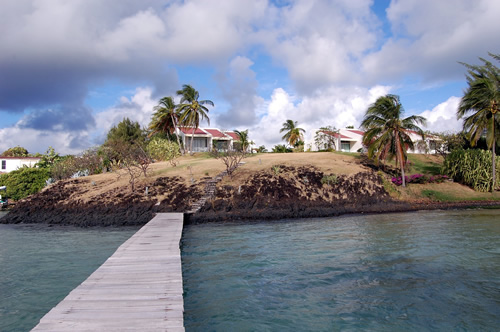Teaching English
in the French Caribbean
The Teaching Assistant Program out of France Makes it Possible
By Philip Cartelli

|
|
Teaching English to the French-speaking population in the Martinique is far from stressful.
|
It can be downright difficult to find a job teaching English in that most desirable latitude to sink one’s feet into the sand for a year: the tropics. There are obvious reasons for this including that the countries located between the Tropics of Cancer and Capricorn are among the world’s “least economically developed,” though their vibrant cultures have continually enticed travelers and expatriates.
There are English teaching opportunities in Latin America, Africa, and southeast Asia but many are connected to volunteer or pay-your-way programs, sometimes unattractive propositions for recent college graduates looking for a first teaching job with decent pay.
There are, however, several exceptions, including the opportunities available in the French Caribbean islands of Martinique and Guadeloupe, and on the northern coast of South America in French Guiana. These three, along with tiny Réunion in the south Indian Ocean, make up the four Overseas Departments, or DOMs (for Départements d’Outre-Mer) of France, roughly the political equivalents of Hawaii in the United States. Due to their economic benefits as French “states,” these regions can afford to pay (and pay relatively well) English teachers as part of a program run through the French Ministry of Education and its Embassy in Washington, D.C. Perhaps the best part of the deal is that neither teaching certificate nor experience is required.
Living in the Eastern Caribbean
After graduating from college, I lived in the southern Martiniquan town of Le Marin for nine months while teaching English 12 hours a week at a local primary school. For my efforts I was paid around €1,100 per month, 30 percent more than those in similar positions in mainland France get paid. The cost of living in the DOMs is slightly above the average in Europe so all DOM state workers, teachers included, benefit from this bonus. Activities in Martinique range from swimming, snorkeling, surfing, and underwater fishing, to hiking the northern range of mountains dominated by the notorious volcano Mt. Pélé. There is also a sport called canyoning, created in Martinique, which involves hiking and rappelling through steep rocky niches to bathe in various waterfalls and natural pools in the rainforest that covers part of the northern interior of the island.
Martinique’s cultural and social life ranges from its cosmopolitan capital, Fort-de-France, to sleepy beachside fishing villages where locals can be reticent until they find out you’re not simply another French tourist, at which point you may find yourself with many new friends.
The benefits of living in a French department include generous healthcare and readily available paté, inexpensive wine, and fresh baguettes in every supermarket. There is also the reality that many locals consider themselves to be francais d’abord et antillais après, “French first and Caribbean second,” although the majority of the local population speaks Kreyol (a mixture of French, English, Spanish, and various African languages) in addition to an accented French.
Lucky for the English teacher, or assistant d’anglais, there are several lengthy vacations during the French school year, permitting travel around the region. A hydrofoil ferry crosses regularly between Martinique and Guadeloupe, also stopping at the neighboring islands of Dominica, a mountainous island covered in tropical rainforest, and St-Lucia, popular for its beaches, small inland and coastal villages, and the one-of-a-kind nightlife in its capital, Castries, where American country music mixes with Trinidadian Soca rhythms in bars and dancehalls.
French Guiana has a more diverse population than its Caribbean counterparts, including southeast Asian and Indonesian immigrants who mix in the streets with Chinese merchants and restaurateurs. Brazilian goldminers and rural Amerindians complete the picture. In tourist brochures the region bills itself as the “French Amazon.” From French Guiana it’s easy to travel overland to neighboring Suriname and Brazil; there are weekly flights from the regional capital of Cayenne to major Brazilian cities and Venezuela.
How To Do It
The English teaching assistant program is comprehensive, meaning that once you are accepted, the Ministry of Education sends you information about where and when to report to an in-country orientation session, how to get a French/European work visa (the DOMs are technically part of Europe). Once in the country, a contact will generally help you find lodging near your school and transportation. I shared an apartment with a Spanish assistant 10 minutes away from my school, paying a reasonable €275 a month. You are responsible for the cost of your roundtrip flight.
The application procedure consists of filling out a short questionnaire, answering several questions in French, and attaching two short letters of recommendation. Applicants to DOMs are asked to include a short note explaining their interest in working outside mainland France. There are three deadlines: December 1, January 1, and February 1. Postings are available at primary, middle, and high schools. A few applicants may be offered positions at the teacher’s training college in the departmental capitals of Fort-de-France (Martinique), Basse-Terre (Guadeloupe), or Cayenne (French Guiana). There are roughly 30 openings in each “department” every year; competition is not fierce. An identical program exists in the island of Réunion.
For more information and to apply, visit the program’s website at The Teaching Assistant Program (TAPIF).
Philip Cartelli has written for Film International and LiveLife Travel.
|
